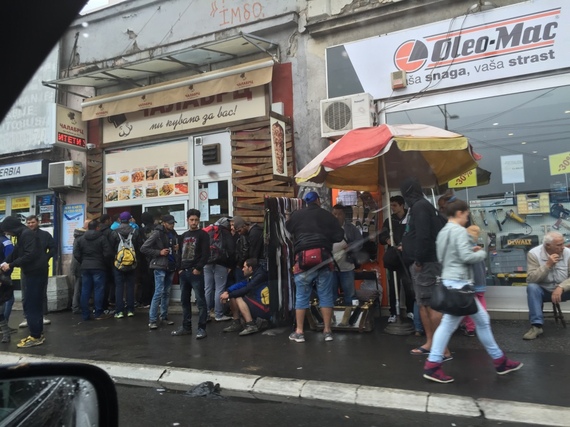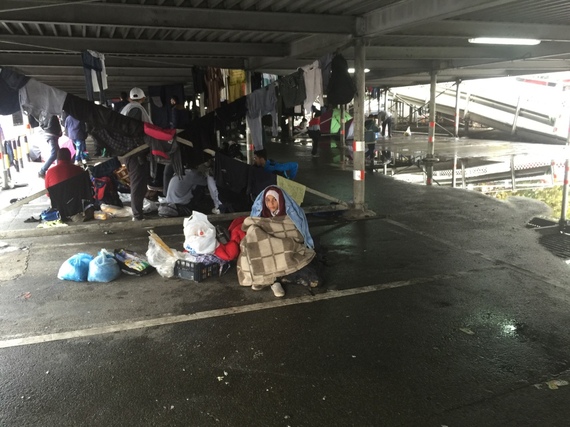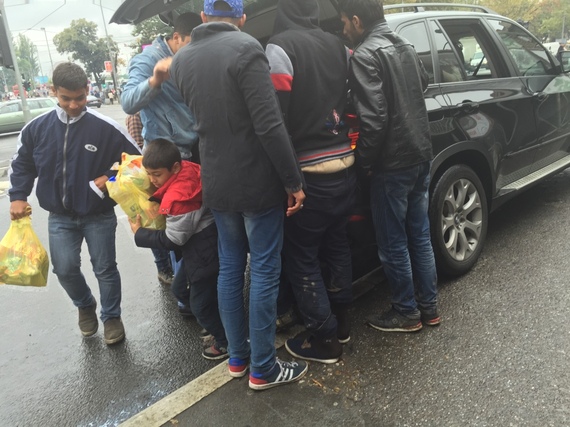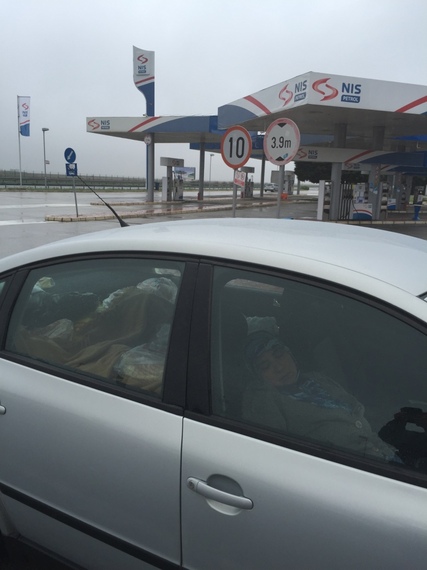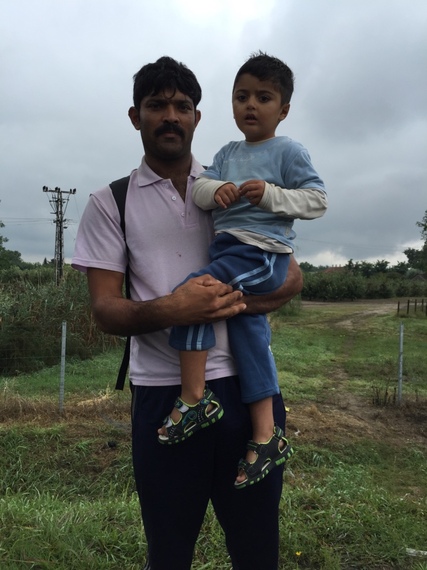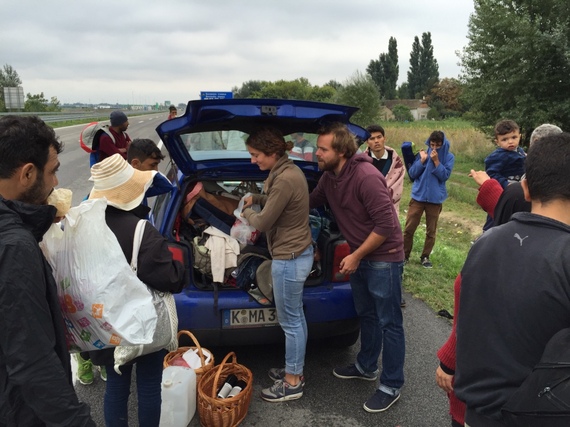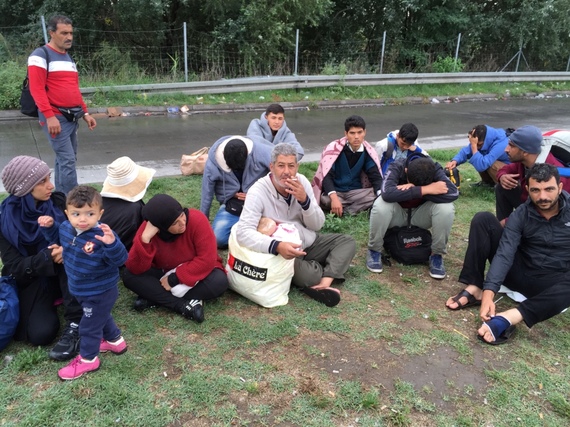
Two men are standing in line to a hotel exchange office, their shoes are muddy. I ask them in Arabic if they are Syrians. They say that they are Turkmen from Iraq. I ask them why they are in Serbia; and one of them replies that I should know of the persecution of Turkmens. Reluctant to tell me about their route or how they ended up here, they say that their final destination is Sweden or Germany.
Outside the hotel I spot a family, all with muddy shoes. Mom and dad are in their 30s with four children, the oldest is about ten years of age. They ask me to not take their photos. They are Sunnis from Damascus. They fled out fear of their city falling into the hands of the Syrian regime and the consequent repercussions they would face because of their faith. They are also on the run from the violence of terrorists. The man doesn't want to talk, the woman is cursing all wars, the rich making their money at the expense of the poor and all the politicians unable to put an end to the conflict and then there is the oil -- causing it all in the first place.
Mlad who is my driver honks the horn, he's not allowed to park here and we must leave. The car I get in to is like a shrine, three Cristian-orthodox icons and a wooden cross from a convent in Montenegro. I ask him if there are more families like the one we just met by the car. "They are everywhere," he says, you see them in the grocery stores, by the fast food stands, and under viaducts where they seek shelter from the rain.
Every time we spot refugees, you can easily tell them apart because of their clothing, muddy shoes and backpacks. I ask Mlad to stop the car so I can take photos. Every time I ask him to stop, he smiles.
We arrive at the bus stop where the buses go from Belgrade to Khorgosh in the North, this is where you need to go in order to get on a bus for Hungary. I realise what he has been smiling about. There was no need for me to ask him to stop so I could take photos. The refugees are everywhere, under a bridge, in tents on the square, sitting on the pavement.
An SUV, one of Mercedes newer models, stops right next to where I'm standing almost running me over. A young man in his 20s steps out and opens the trunk. He shouts to the refugees to come. The car is packed with groceries and the line leading up to it is growing by the second. "Please, don't take my photo" he says, "I don't want trouble, we're just trying to help with what we can."
There's a women in the backseat of the car handing out lollipops, children are gathering around where she is sitting. I ask her if she's working with any of the charity organisations in the area. "No, but how do I sleep knowing there are children here, living under these conditions?" Instead she called her brother early in the morning and asked him to go with her and buy the things they are handing out.
Mlad honks the horn again, the police are right behind him and asking him to move the car. We are headed towards the boarder. I see that latrines have been put up, and I photograph them. A young man comes out of one, he looks me in the eyes and asks " Are you Sahafi, are you a journalist?" he asks. "Tell the world about my friend, he died in a truck. Tell them that on our way to Europe we stopped being enemies, he was Sunni and I'm Alawite. I was in the Syrian army and he was fighting in the Free Syrian army but we are no longer Sunnis or Alawite -- we are Syrians! The Saudis and others made us enemies. Our land is occupied by terrorists, many of them European."
I get in the car and we drive a couple of hundred meters when I see a fight between five young men and another driver. I ask Mlad to stop, I ask the men if they speak Arabic? They tell me that the Serbian driver is trying to scam them, they agreed on a price and now he wants more. The men are Iraqi. The Serbian driver claims it is the other way around, that they are trying to scam him and that he refuses to give their bags back if they don't give him the money. He tells me that he knows that they have money, they showed it to him before. "They are not poor."
Mlad tells me we need to get going, we can't park the car like this. We drive towards the border. After an hour we stop for coffee, I need to go to the toilet as well. Four Syrians are washing up, they are completely exhausted. They are also heading towards the border, unwilling to tell me what the taxi there is going to cost them. I ask about their destination, one of them says they are going to Sweden. As I step out of the lavatory I spot three children and two women with their heads covered, also washing up.
Two well-dressed young men are standing inside the gas station, they speak German but some words exchanged are in Kurdish. I ask them in German if they are here for the football match in Belgrade, many young men on the plane here from Sweden were coming here to see the match. The men look surprised and they ask me why I want to know, I tell them that I am a journalist, that I know a little Kurdish and that I am Assyrian born in southeast Turkey. They tell me they are Yazidi, headed towards the border to aid the relatives of a friend fleeing from Iraq.
Mlad and I buy coffee and start walking to the car. An elder women is sleeping in of the cars on the parking lot, the car is packed with luggage, bags and blankets. Something is moving underneath all that luggage, a little girl.
We drive off, there is barely any traffic. It's raining. Mlad tells me to look at all of the taxi's heading our way. Usually there are not so many taxis going towards the border. There are refugees in all of them. I see children in three of the five taxis that we pass. Mlad tells me that there's probably others, taking refugees as well. The ones without a taxi sign. Unregistered cabs. This turns out to true.
I fall asleep, Mlad wakes me up. A group of close to 50 individuals, mostly men and children are walking on the freeway. We stop the car and I get out. I ask where they are from and where they are going. They are from Syria and Iraq and they are going to Sweden. Further ahead there are about a hundred refugees crossing a bridge. While our focus is on the bridge three men and a child try to cross the highway. We stop the car, Hassan and his son Ali are from Afghanistan, the other two are from Pakistan. They are going to Romania and have been walking for days.
Alongside the freeway is a small road, we see around 30 people, some carrying children on their shoulders. A new set of people is crossing the freeway and we are forced to stop once again. A car is parked 50 meters ahead and refugees are gathering around it. A young couple are handing out food, fruit, water and clothes, even their own jackets and shoes. A young women cries out of gratitude, she comes from Yarmouk -- the Palestinian camp outside of Damascus and she is pregnant. She is travelling with her parents, her one year old and her younger brother. She is exhausted and barely manages to stand up. They have walked 27 kilometres. I want to take the family with us in the car but Mlad is too scared, he's afraid of the police and that it might be illegal to take them.
They have many questions. Will they beat us up at the border? Will they arrest us? Does it matter if you're from Syria or Iraq? Some of them claim they are Syrians, other Iraqis and three of them are Afghan.
I'm helping the pregnant woman to sit down on the curb. She is wearing worn out sandals and her feet are swollen. I take my sneakers off and hand them to her, she gives me her sandals. She is holding my hand, crying. I too am crying. She tells me she is ashamed. I'm the one ashamed. The whole group gathers around me, they have so many questions, most of them I don't have an answer to. Will they be abused at the border? Is this the right border? Is there a crossing to Hungary from here?
I promise to meet them at the border. I won't allow anyone to beat and abuse them.
Mlad drives to the border. The German couple are also there, they are going to Hungary to keep aiding refugees there. Malia Stinshoff laughs, and I ask what is so funny. She tells me I'm wearing her sandals, she gave them to the pregnant woman who now has my sneakers.
Malia and her boyfriend Simon Mund are vacationing in the Balkans; they were supposed to drive around across three countries, a trip they have been planning for ages. They decided to cancel their vacation and help refugees, as much as they can.
I walk up to a policeman, I tell him that around ten refugees are on their way, will they be let across and into Hungary? He says he is not allowed to let them pass. I ask if there is any place they can gather, they are tired and dirty and need to wash up and rest. I tell him there is a pregnant woman and a child among them. He says he wishes he could help them. He shows me photos of others he has helped in a centre for refugees in his spare time.
Another policeman joins us. He tells me there are alternative ways. He winks his eye and looks towards a fence with a hole cut in it. The refugees are getting near now, I walk towards them and tell them that they cannot get across. They are devastated, they sit down on the ground. Another policeman comes up to me and asks if I have permission to take photos by the border. Here you need permission because it is a protected area. I say I'm sorry, I should have thought about seeking such a permit.
I sit down among the refugees, they are very afraid showing me scars and bruises from abuse. They tell me Turkish and Macedonian police hit them. They are afraid that the Serbian police will do the same. The show me the papers they have received from the Serbian border police. I ask them what it is and they tell me that its temporary visas, they are allowed in Serbia for 72 hours.
I ask the refugees if they have sought asylum in Serbia, but none of them want to stay here. One of them hands me a cigarette and whispers "We recognized an Al-Nusra fighter on the way between Greece and Macedonia, that's the ones they need to be tough on, not us, we are refugees."
An Afghan man is trying, in very poor Arabic to explain to what minority he belongs and why he had to run. The mother of the pregnant woman walks up to me and tells me she needs to go somewhere to change her grandson's diaper. I ask the policeman if this is okay and he says "of course," then he tells me that the police cannot advise people to illegally go in to Hungary. But they can't arrest people who did no crime either, but they can't just sit here by the border.
Twenty minutes later, the refugees are on their way. They walk from the freeway in to the woods. Just under the whole in the fence there is a ditch, they cannot cross it so they head up again. We walk two hundred meters in and they finally find a place where they can cross. They ask me to pray for them, they wave and walk off in to the woods.

